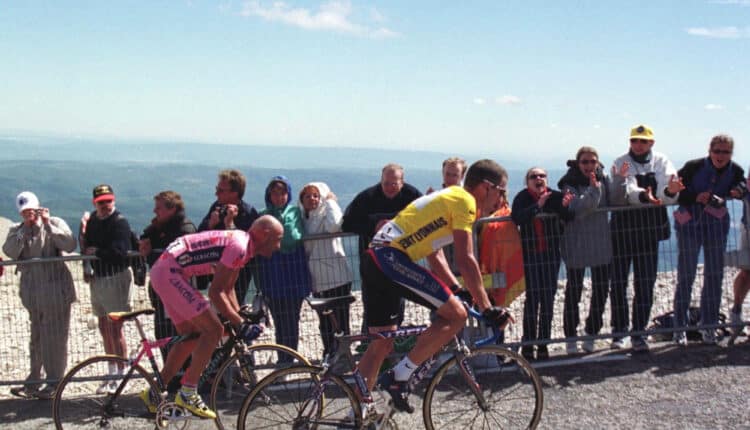
The 2000 Tour de France was the 87th edition of the prestigious cycling race, held from July 1 to July 23, 2000. The race covered a total distance of approximately 3,662 kilometers (2,274 miles) and consisted of 21 stages, including a prologue and a final stage in Paris.
Lance Armstrong’s Dominance: The most notable aspect of the 2000 Tour de France was the dominance of Lance Armstrong. The American cyclist, riding for the U.S. Postal Service team, won his second consecutive Tour de France title. Armstrong displayed exceptional climbing and time trial abilities, securing his status as one of the greatest cyclists of his era.
Final Podium: The final podium in Paris saw Armstrong atop, with the German cyclist Jan Ullrich (Team Deutsche Telekom) finishing in second place and the Kazakh rider Alexander Vinokourov (Team Telekom) in third.
Doping Controversy: While Armstrong’s achievements during the 2000 Tour de France were initially celebrated, subsequent years brought doping allegations and investigations. In 2012, Armstrong was stripped of his seven Tour de France titles and banned from professional cycling for life by the United States Anti-Doping Agency (USADA) due to his involvement in systematic doping.
Team Time Trial Incident: One memorable incident during the race was the Team Time Trial stage where Armstrong’s handlebar got caught on a spectator’s bag. Despite the incident, Armstrong and his team performed well in the stage.
Final Stage in Paris: The traditional final stage on the Champs-Élysées in Paris concluded the 2000 Tour de France. Armstrong celebrated his victory on the podium, marking the beginning of his remarkable seven consecutive Tour de France victories.
Despite later controversies, Armstrong’s performance in the 2000 Tour de France remains a significant chapter in the history of the race.

2000 Tour de France: Yellow Jersey, Green Jersey, Polka Dot Jersey and White Jersey
In the 2000 Tour de France, the jersey winners were as follows:
- Yellow Jersey (Overall Leader): Lance Armstrong (United States) – Riding for the U.S. Postal Service team, Armstrong secured the yellow jersey as the overall winner of the race. (LATER NULLIFIED)
- Green Jersey (Points Classification): Erik Zabel (Germany) – The German sprinter, riding for Team Telekom, won the green jersey for leading the points classification. Zabel was known for his sprinting prowess and consistently performed well in the flat stages.
- Polka Dot Jersey (King of the Mountains): Santiago Botero (Colombia) – Riding for the Kelme-Costa Blanca team, Botero excelled in the mountainous stages and earned the polka dot jersey for being the best climber in the race.
- White Jersey (Best Young Rider): Francisco Mancebo (Spain) – Mancebo, riding for the Banesto team, won the white jersey as the best young rider in the general classification.
These jersey winners were recognized for their achievements in specific categories throughout the 2000 Tour de France.
Overall Ranking – Tour de France 2000:
Winning the Tour de France involves excelling in the general classification, which takes into account the overall time a rider takes to complete all the stages of the race. The rider with the lowest cumulative time at the end of the race wears the coveted yellow jersey and is declared the overall winner.
- Lance Armstrong (United States) – U.S. Postal Service (LATER NULLIFIED)
- Jan Ullrich (Germany) – Team Deutsche Telekom
- Joseba Beloki (Spain) – Festina
- Christophe Moreau (France) – Festina
- Roberto Heras (Spain) – Team Kelme-Costa Blanca
- Richard Virenque (France) – Team Polti
- Santiago Botero (Colombia) – Team Kelme-Costa Blanca
- Fernando Escartín (Spain) – Team Kelme-Costa Blanca
- Francisco Mancebo (Spain) – Banesto
- Daniele Nardello (Italy) – Mapei–Quick-Step
These rankings represent the final standings of the top 10 riders in the general classification at the conclusion of the 2000 Tour de France.
Stage Winners – Tour de France 2000:
The stages of the 2000 Tour de France varied in terms of terrain, distance, and difficulty. Here’s a breakdown of the types of stages and notable characteristics:
- Prologue: A short individual time trial held in Futuroscope, setting the initial overall standings.
- Flat Stages: Several flat stages, such as Stage 2 from Futuroscope to Loudun, Stage 3 from Nantes to Laval, and Stage 5 from Châteaudun to Tours. These stages were well-suited for sprinters.
- Time Trials: The race included individual and team time trials. The prologue and Stage 18 (Montpon-Ménestérol to Saint-Émilion) were individual time trials, while Stage 2 (Loudun to Nantes) featured a team time trial.
- Mountain Stages: Challenging mountain stages were a crucial part of the race, testing the climbers. Notable mountain stages included Stage 9 from Dax to Hautacam, Stage 11 from Castelnaudary to Ax-3 Domaines, and Stage 14 from Tarascon-sur-Ariège to Cap d’Agde.
- High Mountain Finish: Stage 12 from Perpignan to Plateau de Bonascre and Stage 15 from Saint-Gaudens to Pla d’Adet featured high mountain finishes, adding an extra layer of difficulty.
- Transitional Stages: Some stages, like Stage 10 from Luchon to Revel and Stage 13 from Saint-Girons to Loudenvielle, served as transitional stages, providing riders with a mix of terrain.
- Individual Stages of Note: Stage 20 from Mourenx to Bordeaux was a flat stage, and Stage 21 from Évry to Paris Champs-Élysées marked the traditional final stage in Paris.
The route was designed to challenge riders with a mix of flat sprints, time trials, and challenging mountainous terrain, ultimately determining the overall winner of the Tour de France. Lance Armstrong’s dominance in the mountain stages and time trials played a significant role in securing his victory in the 2000 edition.
Click here to remember who the winners of the Tour de France 2010 were.

